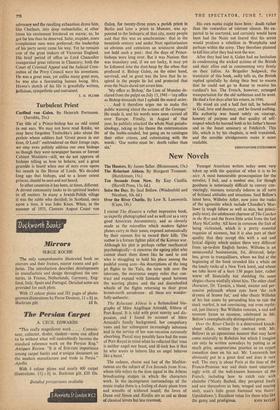Turbulent Priest
Cardinal von Galen. By Heinrich Portmann. (Jarrolds, 21s.) THE title of a Prince-bishop has an odd sound in our ears. We may not have read Ra'nke, we may have forgotten Treitschke's joke about the prelate whose soldiers had 'Grant peace in our time, 0 Lord!' embroidered on their forage caps, we may even politely address our own bishops as though they were newspaper barons or former Cabinet Ministers—still, we do not approve of bishops telling us how to behave, and a great grumble is heard when one of ours even opens his mouth in the House of Lords. We decided long ago that bishops, and to a lesser extent princes, should be seen and not heard.
In other countries it has been, at times, different. A devout community looks to its spiritual leaders in all matters. In many a Jewish-Polish village it was the rabbi who decided; in Scotland, once upon a time, it was John. Knox. When, in the summer of 1933, Clemens August Count von Galen, for twenty-three years a parish priest in Berlin and later a priest in Munster, was ap- pointed to the bishopric of that city, many people said that this was an anachronism : that in the twentieth century and under Nazi egalitarianism so obvious and conscious an aristocrat should not hold such a post : that the days of Prince- bishops were long over. But it was Nazism that was transitory and, if we are lucky, it may yet be followed into the dust-heap by the ethos that produced it. Bishop Galen, on the other hand, survived, and so great was the love that he in- spired in the people he led and protected that even the Nazis dared not arrest him.
'My office as Bishop,' the Lion of Munster de- clared from the pulpit on July 13, 194 (=my office as Bishop demands that I uphold the moral order. . . . And it therefore urges me to make this public warning about the actions of the Gestapo.* He made it, and his words were soon carried all over Europe. Finally, in August of that year, he publicly attacked the whole Nazi pseudo- ideology, taking as his theme the extermination of the feeble-minded, but going on to catalogue their other crimes, and culminating with the words : 'Our motto must be : death rather than sin.' His own motto might have been : death rather than the cowardice of tolerant silence. He ex- pected to be martyred, and certainly would have been had the Nazis not feared that his arrest would produce a rebellion in Westphalia and perhaps within the army. They therefore planned to kill him after they had won the war.
After they had lost it, Galen had no hesitation in condemning the wicked actions of the British and their allies and in commenting very firmly on their follies. As Brigadier Sedgwick, the translator of this book, sadly tells us, the British replied spitefully by doing their best to ensure that he could not go to Rome to receive his cardinal's hat. The French, however, arranged transportation for the old nobleman and he went. He died a few days after his return, in 1946.
He stood six and a half feet tall, he believed in God, love and decency, and he feared nothing. His authority was based solely on courage, honesty of purpose and that quality of self- respect which he learned both in his father's house and in the Jesuit seminary at Feldkirch. This life, which is by his chaplain, is well translated, and the sensible abridgements make it more readable.
CONSTANTINE FITZGIBBON


































 Previous page
Previous page